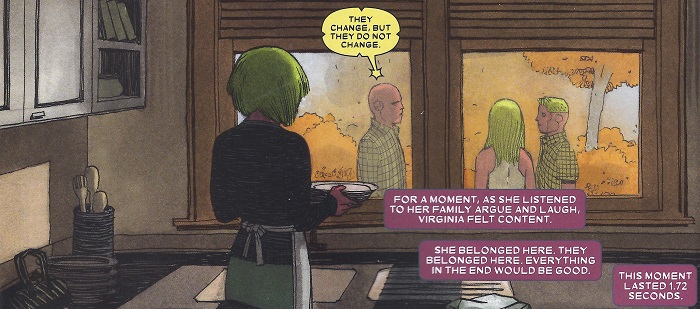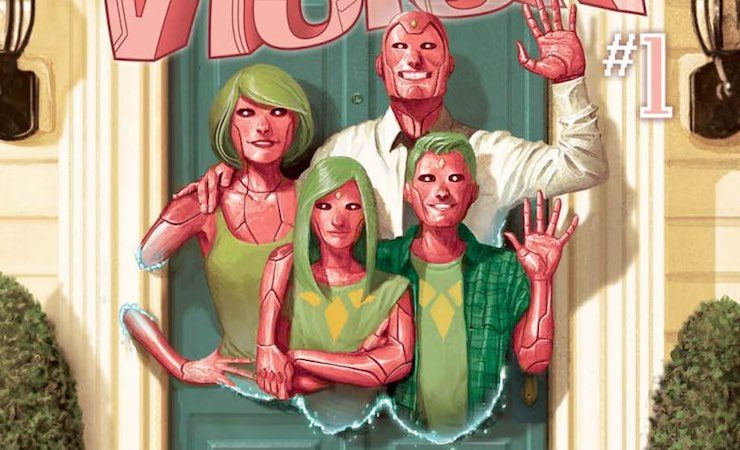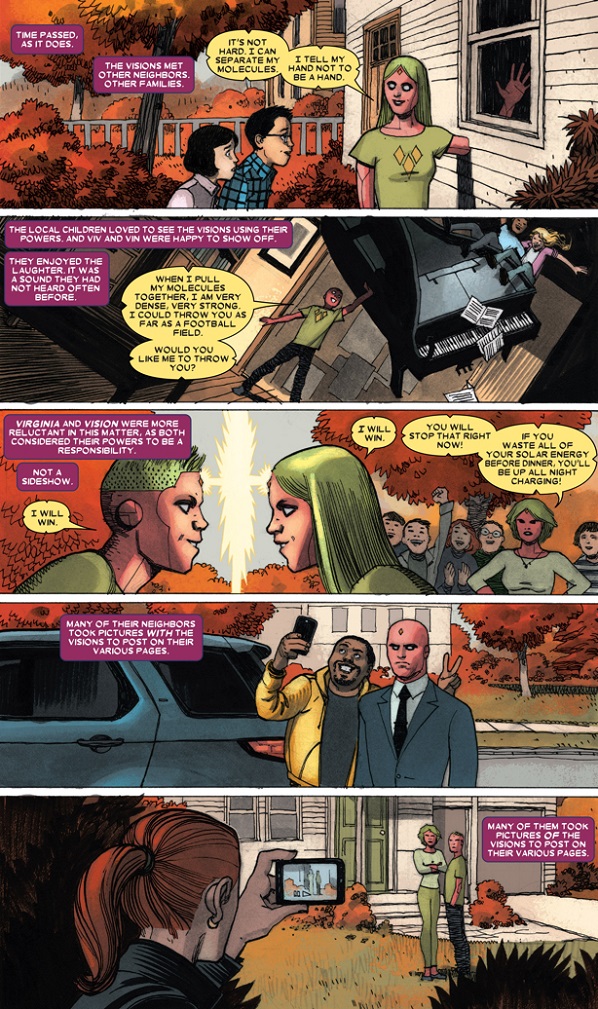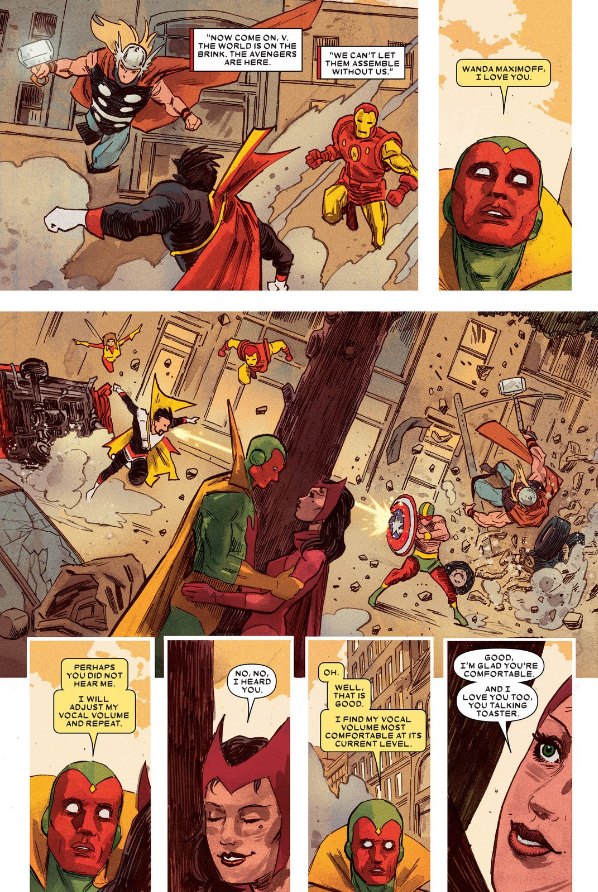I absolutely adore this trend in comics of showing superheroes off duty and dealing with day-to-day issues, where it’s less about physical prowess and more about the ramifications of using their abilities. It’s more interesting to me to see the powerful confront their powers and the effect their powers have on the powerless. Matt Fraction and David Aja’s Hawkeye is hard to beat, but Tom King and Gabriel Hernandez Walta’s The Vision comes close. This isn’t a story about Vision kicking ass and taking names but a smaller scale tale of ethics versus morality, family versus friends, interlopers versus denizens.
Origin Story
Tired of being alone and desperate to be seen as normal, the Vision builds himself a family. There’s his lovely wife Virginia and their two children, twin teenagers Viv and Vin. They live in a quiet Washington D.C. suburb where Vision pulls double duty with the Avengers and as an advisor to the president, Virginia plays the dutiful housewife, and the kids go to public school. Yet the assimilation comes with its own set of challenges. Despite his best intentions, it all goes tragically awry. As his creations struggle with the cold logic of being a synthezoid with the inherently contradictory and messiness of acting human, the bodies of humans and superhumans alike begin to pile up. The witch Agatha Harkness delivers to the Avengers a grave warning that he will destroy them all, and once again a rift opens up between the teammates and Vision. Victor Mancha, Vision’s brother and teen superhero Victorious, joins the family and things go from bad to good to worse.
The Vision is helmed by writer Tom King (Grayson, The Omega Man) artist Gabriel Hernandez Walta (Magneto vol 3, Astonishing X-Men vol 3), colorist Jordie Bellaire (Pretty Deadly, Plutona), and letterer and producer Clayton Cowles (Patsy Walker, A.K.A. Hellcat!, Civil War II). Michael Walsh (Secret Avengers, Comeback) guests for the interior art on issue #7. The first issue was released by Marvel on November 4, 2015, and the most recent issue, #10, on August 10, 2016. The first 6 issues are collection into the trade “Little Worse than a Man.”

To Pull Or Not To Pull
You don’t have to know Vision’s backstory—issues #5 and 7 do a pretty good job of hitting the high points—but it definitely helps. Here’s the short and sweet. Vision made his first appearance in 1940, but not until 1968 is he the superhero we know today. He was created by Ultron (who in turn was created by the original Antman, Dr. Hank Pym) using a copy of the brain patterns of Wonder Man (aka Simon Williams, brother of Eric Williams the Grim Reaper), but rebels against his maker and sides with the Avengers. Eventually he and Wanda Maximoff, the Scarlet Witch, fall in love and get hitched. Due to the synthezoid’s infertility, Wanda uses magic to have twin boys, and it’s later revealed she unintentionally used fragments of Mephisto’s soul. He’s taken apart by agents of Immortus then recreated minus Simon’s brain patterns, thereby rendering him bone white and emotionless. Their kids die and in the future are more or less reincarnated as Billy Kaplan and Tommy Shepherd, aka Wiccan and Speed.
After more stuff goes down involving memory wipes, new brain patterns, alternate universes, and the resurrection of Wonder Man, Wanda and Vision split up for good. Later, the Scarlet Witch teams up with Doctor Doom to attempt to resurrect her dead children and ends up getting possessed and killing a bunch of people, including Vision. Tony Stark rebuilds him in 2012, just in time to establish an audience for his arrival in the MCU. At the start of The Vision, our hero has created Virginia off Wanda’s brain patterns and their children after bits of both of them.
While the specifics of his biography aren’t necessarily important to The Vision, the larger themes are. Much of Vision’s life has been defined by one being imposing their will upon another, loss of choice, and what to do when a functional family becomes dysfunctional, not to mention the debates over the ethics of creation. All of these issues are played out in real time in King and Walta’s series. Vision was abused by his first family and walked away from his second. Rather than seek out his semi-adopted children or forge a new relationship he instead builds one out of carbon copies of a man he never really was and a woman who no longer loves him. He isn’t just making his family; he’s literally recreating his failed marriage, living vicariously through Wanda and Simon’s (now defunct) relationship, and attempting to succeed where his father failed in creating and controlling his heirs.
No matter how much Vision wants to be normal, his very nature ensures that he can’t be. The results of him forcing normalcy on himself, his family, his team, and his community triggers everyone’s downfall, which pushes him further from the life he wants and closer to the destiny Ultron chose for him, that of the destroyer of the Avengers. On top of that, his cycle of destruction evaporates Victorious’ haze of pseudo normalcy. Neither of Ultron’s sons want to be who they are, but neither can figure out how to make that change permanent, especially when those they wish to integrate with always end up rejecting them anyway.
Although his name is on the cover, the heart of the story goes to Virginia, Viv, and Vin. Vision sets the tone, but Virginia activates the plot while Viv and Vin suffer the most from her actions and are used by their parents as excuses to behave amorally. And here’s where it gets tricky. Does Vision love Virginia or the woman from whom she was copied? Is Virginia’s violence inspired by her present circumstances or flickers from Wanda’s tempestuous personality? Is Viv’s deep well of empathy the perfected state of the shadows of her parents’ lost humanity or an adaptation to her environment? Does Vin understand the difference between being normal, acting normal, and wishing to be normal? If being human means participating in a collective illusion, is it worth the hassle of perpetuating? Does the very acknowledgement of it being a charade negate the whole experience or make it all the more meaningful?
Tom King is an incredible storyteller, and his recent rise to household name is well-deserved. King now has an exclusive contract with DC so presumably his time at Marvel is nearing an end, but for now we can all revel in his intricate, poignant story. I can’t think of a better artist for The Vision than Gabriel Hernandez Walta. The style of this relative unknown is absolutely perfect for King’s story. Walta’s Vision family is eerie and distant, their rigidity and formality practically oozing through the ink. Even without the linework patterns on their bodies, Walta beautifully conveys the immediate difference between the humans and the synthezoids.
Once again Jordie Bellaire nails the colors, picking tones that ratchet up the tension or magnifies the looming dread. Clayton Cowles continues to be the go-to guy for great lettering, using a variety of oddly colorful and strikingly unique bubbles for speech, narration, and flashbacks. Michael Walsh also makes for a fine substitute for the dreamy flashback of issue #7. Agatha Harkness recounts a history that isn’t hers from the inhuman perspective of a robot. Walsh’s scratchy linework heightens the fuzzy narrative, giving it the feel of a mostly forgotten memory.
There’s a reason people are singing the praises of The Vision. It’s a powerful, heartbreaking story about what happens when love and duty conflict and what it even means to be “normal.” It was Vision’s Ultron-like hubris that led him down this path and his human-like pathological need to be loved and accepted that keeps him on it. King and Walta have crafted an unrelenting, unexpected story peppered with understated moments of humor and charm. With the demise of Midnighter, The Vision is now by far one of the best series out there from the Big Two this year. Get thee to thy local comic book shop right quick.
Alex Brown is a teen librarian, writer, geeknerdloserweirdo, and all-around pop culture obsessive who watches entirely too much TV. Keep up with her every move on Twitter and Instagram, or get lost in the rabbit warren of ships and fandoms on her Tumblr.












